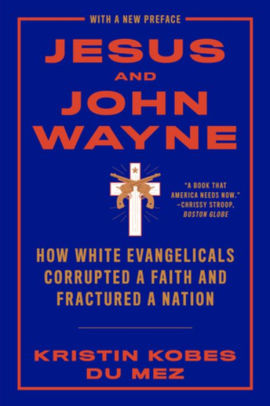
Jesus and John Wayne: How White Evangelicals Corrupted a Faith and Fractured a Nation
Kristin Kobes Du Mez
About the Author

Kristin Kobes Du Mez
Questions & Answers
The portrayal of masculinity in American evangelicalism has significantly influenced political and social movements, particularly in relation to traditional family values, national security, and the military's role. Evangelical masculinity, rooted in rugged individualism and patriarchal authority, has reinforced conservative values. This has led to strong support for traditional family structures, opposing feminism and advocating for male leadership. The defense of national security and the military's role stem from the belief in masculine strength and protection, with the military seen as a force for good and a protector of Christian America. This ideology has bolstered conservative political alliances, particularly with the Republican Party, and has shaped policies on issues like abortion, civil rights, and foreign policy. The influence of this masculinity extends beyond the U.S., affecting global movements and ideologies.
The concept of "biblical patriarchy" has significantly shaped conservative evangelicals' beliefs and behaviors. It emphasizes male authority, gender roles, and the defense of traditional masculinity, which is often linked to national security and Christian nationalism. This ideology has been integrated into broader political and cultural narratives in several ways:
-
Family Values: Patriarchy is intertwined with "family values" politics, advocating for traditional gender roles and the protection of the nuclear family, which is seen as the foundation of society.
-
Cultural Conservatism: Patriarchy aligns with cultural conservatism, opposing social changes like feminism, civil rights, and LGBTQ+ rights, which are viewed as threats to traditional values.
-
Political Engagement: Conservative evangelicals have used patriarchal beliefs to influence political decisions, supporting policies that reinforce male authority and traditional gender roles, such as opposition to abortion and same-sex marriage.
-
Religious Identity: Patriarchy has become a defining characteristic of conservative evangelical identity, creating a cohesive cultural and political movement that has influenced American politics and culture.
Figures like John Wayne have been used to reinforce a rugged, heroic, and masculine vision within American evangelicalism. Wayne's embodiment of the American cowboy and soldier symbolized strength, protection, and a sense of order, aligning with conservative values. Evangelicals celebrated him for his toughness and willingness to fight for justice, linking this to Christian manhood. This vision of masculinity, often violent and unyielding, has permeated evangelical culture, influencing everything from media to politics. It has reinforced a culture of fear and embattledness, leading to a culture war mindset. This has had a significant impact on the broader culture, shaping perceptions of manhood, gender roles, and national identity, often at odds with more progressive values.
The rise of "militant evangelical masculinity" has significant implications for gender equality, racial relations, and religion's role in public life. This movement reinforces patriarchal norms, promoting male dominance and reinforcing traditional gender roles. This can lead to:
-
Gender Inequality: By emphasizing male leadership and female submission, it undermines gender equality, limiting women's roles in both the church and society. This can exacerbate issues like domestic violence and limit women's leadership opportunities.
-
Racial Relations: The movement's emphasis on white masculinity and Christian nationalism can exacerbate racial tensions. It often aligns with white supremacist ideologies, reinforcing racial hierarchies and contributing to systemic racism.
-
Religion in Public Life: Militant evangelical masculinity can lead to a more aggressive and political form of religion. This can result in the religious right using their influence to push for policies that align with their beliefs, potentially marginalizing other religious and secular voices in public discourse.
Influential evangelical leaders like James Dobson and Jerry Falwell have significantly shaped conservative evangelical political identity by promoting patriarchal authority, Christian nationalism, and a culture of fear. Dobson, through Focus on the Family, advocated for strict enforcement of patriarchal authority in the home and society, while Falwell emphasized a strong national defense and "macho" masculinity. This identity has had a profound impact on American politics:
-
Shift in Evangelical Partisanship: These leaders helped realign white evangelicals from the Democratic Party to the Republican Party, transforming them into a powerful political force. Their influence led to increased Republican support on social issues like abortion, same-sex marriage, and traditional gender roles.
-
Militarism and Nationalism: Falwell's advocacy for strong national defense and military power resonated with evangelicals, fostering a culture of militarism and nationalism. This has influenced foreign policy, including support for military interventions and a strong stance against perceived threats like communism and Islamic terrorism.
-
Cultural Wars: The concept of a "culture war" was popularized by these leaders, framing political debates as battles between good and evil. This has polarized American society and politics, with issues like abortion, LGBTQ rights, and religious freedom becoming central battlegrounds.
-
Political Activism: Evangelical leaders have encouraged grassroots activism, mobilizing voters and influencing policy. Organizations like the Christian Coalition and Concerned Women for America have played significant roles in shaping political agendas.
Overall, the conservative evangelical political identity, shaped by leaders like Dobson and Falwell, has become a dominant force in American politics, influencing policy on a range of issues and contributing to the country's increasingly polarized political landscape.